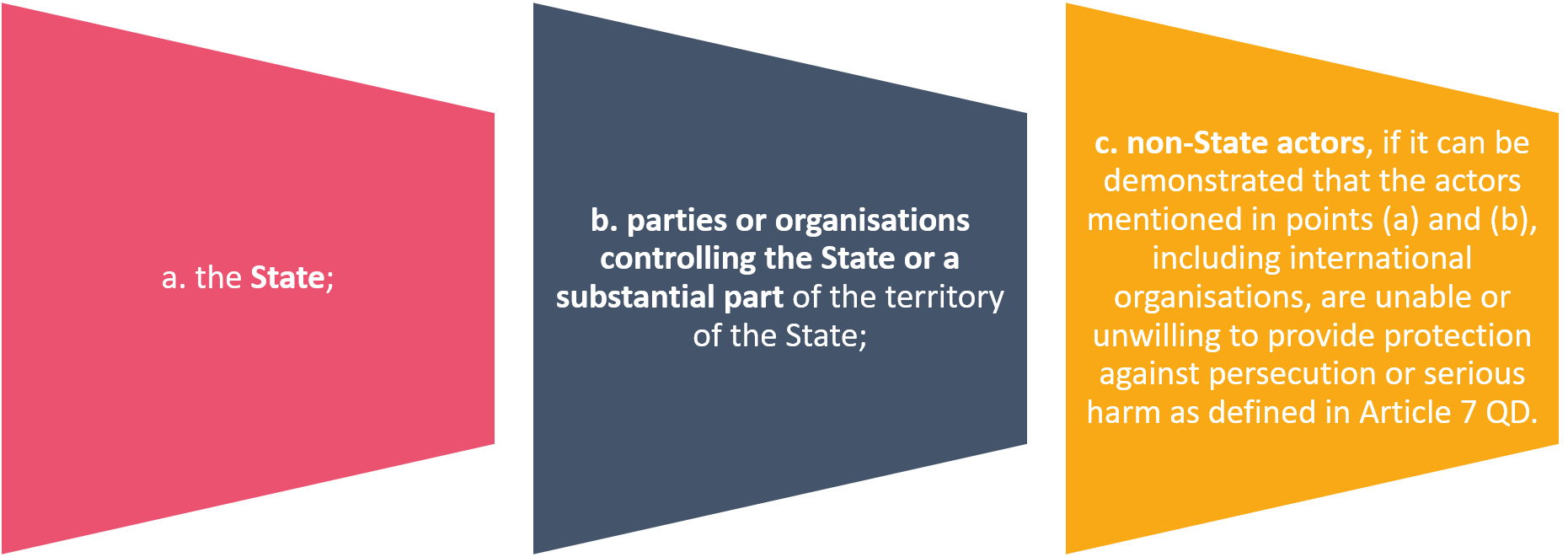GUIDANCE NOTE
Last update: October 2021
Risks to which a population of a country or a section of the population is generally exposed do not normally create in themselves an individual threat which would qualify as serious harm (Recital 35 QD). Generally, persecution or serious harm must take the form of conduct of an actor (Article 6 QD).
According to Article 6 QD, actors of persecution or serious harm include:
Figure 1. Actors of persecution or serious harm.

The following are the conclusions concerning some of the actors, as indicated in applications for international protection. The list of potential actors of persecution or serious harm is non-exhaustive.
|
■
|
The Nigerian State authorities and affiliated actors, such as the Nigerian Armed Forces (NAF), the Civilian Joint Task Force (CJTF), the Nigeria Police Force (NPF) and the Islamic Police (hisbah), are accused of committing a wide range of human rights violations, including unlawful killings, sexual violence and abuse, recruitment and use of child soldiers, arbitrary arrest and detention, torture and other forms of ill treatment of civilians.
|
| ■ |
Boko Haram is a Salafi-jihadist group fighting for the replacement of the secular Nigerian state with an Islamic one. It operates mainly in the North East of Nigeria but has also expanded its reach into north-western Nigeria. In 2016, Boko Haram split in Jama’atu Ahlis Sunna Lidda’adati wal-Jihad (JAS) and the Islamic State - West Africa Province (ISWAP). JAS is characterised by the use of more violent methods and continues to perpetrate systematic attacks against both Muslims and Christians. ISWAP criticised the targeting of Muslims and focused its attacks on Christians and persons not abiding by Sharia law (‘infidels’), military structures, government and security personnel, traditional leaders and contractors. However, in 2020, attacks of ISWAP against unarmed civilians, including Muslims, indicated a shift in their stance.
|
| ■ |
There are a number of militant groups operating in the Niger Delta area demanding an improvement of the conditions in the region and protesting against its environmental degradation due to oil exploitation. The Niger Delta Avengers (NDA) and, the Movement for the Emancipation of the Niger Delta (MEND) had been particularly active in the past. Since early 2018, no major incidents involving the NDA or MEND have been found in the consulted sources.
|
| ■ |
In the South East of Nigeria there are several separatist groups, among which the two main groups currently are the Movement for the Actualization of the Sovereign State of Biafra (MASSOB) and the Indigenous People of Biafra (IPOB). Both organisations mostly engage in awareness-raising activities, marches, and other non-violent gatherings. Since August 2020 violence between IPOB and the Nigerian security forces has escalated. IPOB’s paramilitary wing, the Eastern Security Network (ESN) has engaged in armed clashes with Nigerian state forces.
|
| ■ |
Among the non-State actors of persecution or serious harm, the herders and farmers participating in armed groups and communal militias have become increasingly relevant. The origins of the conflict are rooted in the difficulties to access natural resources such as water and land. Furthermore, long-standing tribal, ethnic, religious and community disputes continued to lead to violence, involving communal militias.
|
| ■ |
Student cults in Nigeria, also referred to as ‘university cults’ or ‘confraternities’, resemble criminal gangs, with violent initiation rites and illegal activities such as: killings, human trafficking, sexual exploitation, slavery, drugs trafficking, smuggling, extortions, kidnapping, forced recruitment, etc. Some of the most well-known cults are the Black Axe and Eiye.
|
| ■ |
Trafficking within Nigeria and to other countries, including in EU Member States, is a significant problem concerning applicants from Nigeria. The traffickers may use deception, such as false offers of jobs and promises of safe travel to destination countries, and manipulation through traditional beliefs (juju). In some circumstances, the victims’ families support and encourage the trafficking for economic reasons. The exploitation can take different forms, such as prostitution or other forms of sexual exploitation, forced labour, slavery, removal of organs, ‘baby factories’, etc.
|
| ■ |
Human rights violations may also be committed by other criminal groups. Some of these acts are purely criminal activities and could include kidnapping, armed robbery, murder and rape.
|
| ■ |


